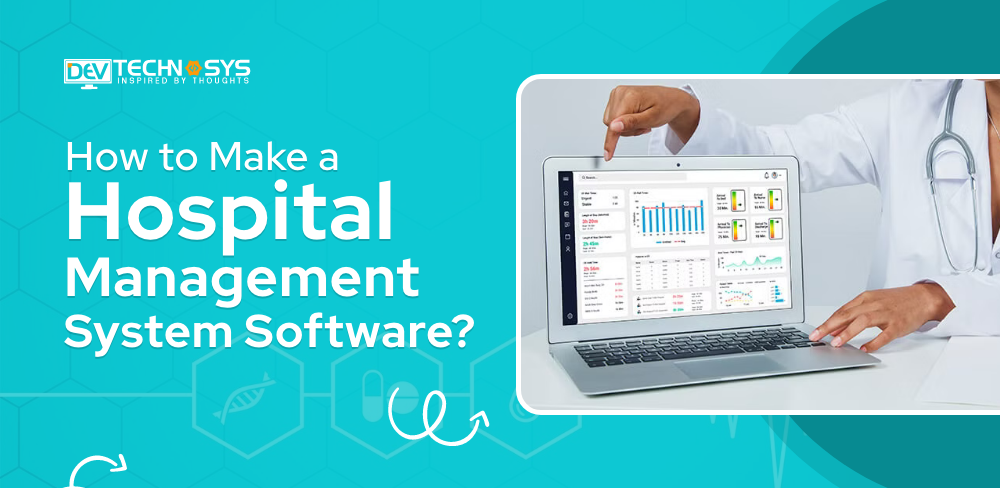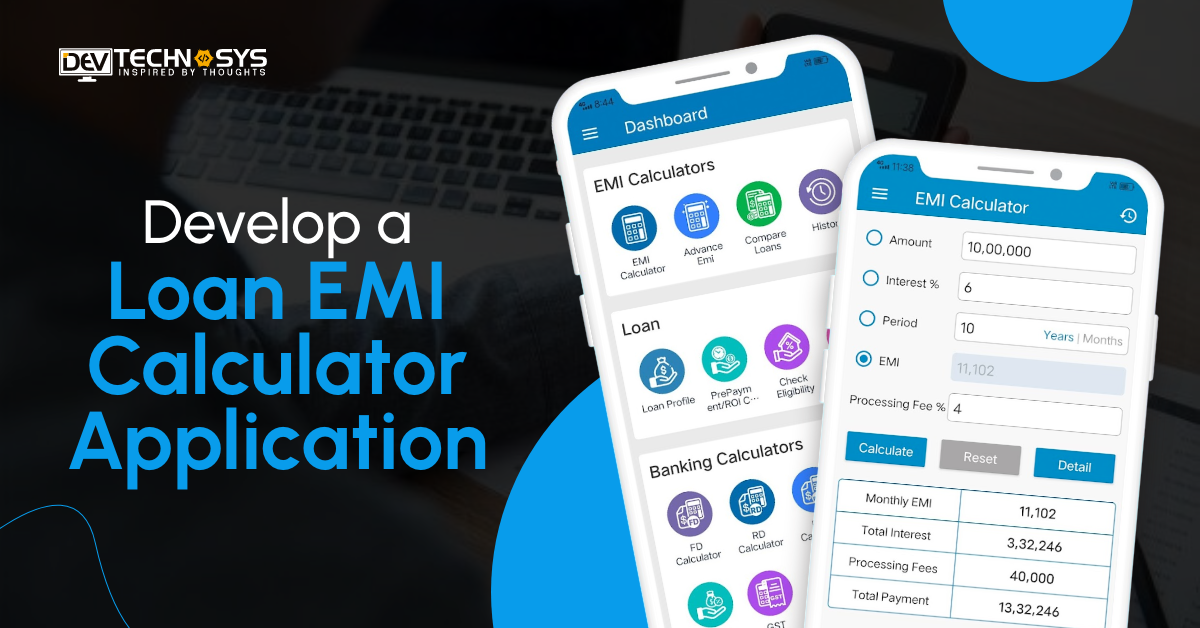“Transforming chaos into cohesion, hospital management software is the guardian angel of healthcare institutions, ensuring order and efficacy.”
Quick Summary: Are you looking to develop a hospital management system software? If yes, then you are at the correct place. This blog will guide you on creating a robust hospital management system along with its features, costs, benefits and so on.
Technology integration is now essential for maintaining smooth operations and the highest quality of patient care in the ever-changing healthcare industry. One pivotal technological advancement that has revolutionized the healthcare sector is the development of hospital management system software.
It is essential for increasing communication, expediting administrative work, and raising general productivity in a medical facility. Hospital Management System Market size is projected to be $57.47 billion in 2024 and $80.43 billion by 2029, with a CAGR of 6.95% throughout the forecast period.
This shows that the demand for the HMSS will rise in the coming years. Due to this, various businesses are looking to invest in HMS software development. Are you also one of them, then you should read this blog till the end.
So, let’s begin.
Table of Contents
What is a Hospital Management System?
Hospital management system software is a comprehensive solution that manages all the complex tasks within a hospital. It assists in streamlining administration, monetary and clinical aspects of hospital operations.
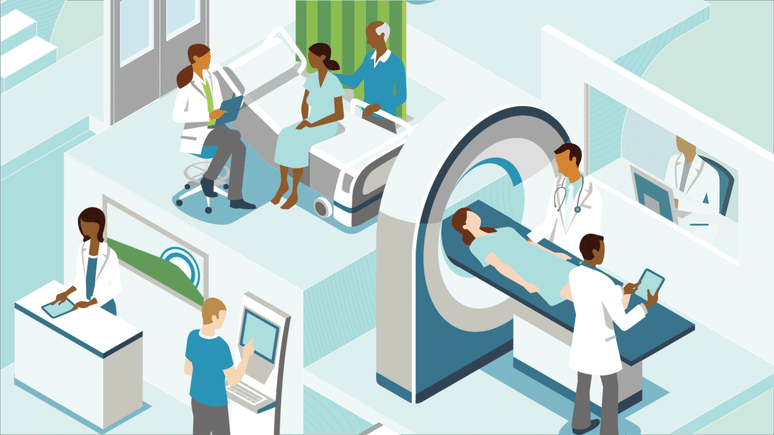
Additionally, this patient management software helps to handle patients details & information, appointment scheduling, patient’s health data, invoice & billing, laboratory & pharmacy management.
Patient visit alerts can be enabled by email or text message using clinic management software. Some of the famous hospital management systems are eHospital, MediSteer, Smartsheet and so on. So, if you want to develop an advanced hospital management system software with CRM integration, then you should hire a development firm who provides healthcare CRM software solutions.
Market Stats of Healthcare Industry
- Hospital Information System Market size is projected to be $57.47 billion in 2024 and $80.43 billion by 2029, with a CAGR of 6.95% throughout the forecast period.
- fresh investments are made in the field of digital health, mostly in startups. From 1.1 billion US dollars in 2010 to around 22 billion dollars in 2020, invested investment grew quickly.
- The AI In healthcare industry was valued around 11 billion US dollars globally in 2021.

- The global population health management solutions revenue in 2016, and presents a prediction for 2025, by globe region. In 2016, North America accounted for 74% of the worldwide market.
- It was predicted that the smart hospital industry will be worth 83 billion dollars by 2026.The market for smart hospitals, which was already valued at billions in 2021, is anticipated to expand rapidly in the years to come. By 2024, it was estimated that the entire EHR market will be worth about 40 billion dollars.
Steps to Develop a Hospital Management System Software
Now you must be thinking “how to make hospital management system software?”. Well, it can be quite difficult but with the help of a custom software development company, you can easily build your own software. But first, you should look at the step-by-step process of the hospital patient management system software.
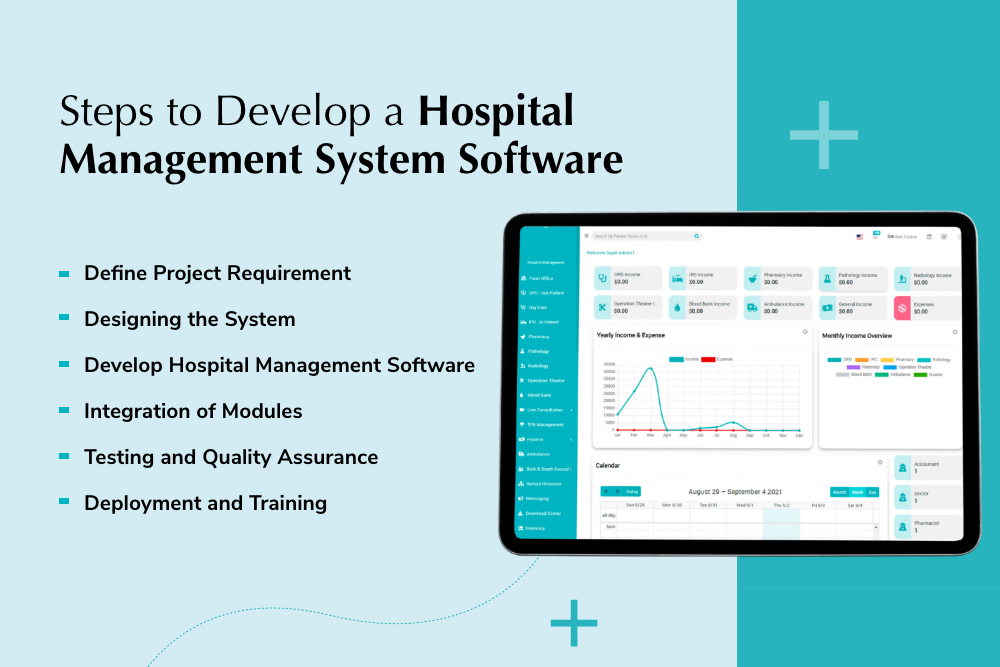
1. Define Project Requirement
Before entering into coding, it is critical to understand the hospital’s particular demands and operations. You must interact with healthcare experts, leaders, and other groups to identify particular needs. A thorough grasp of the hospital’s particular issues and operations will lay the groundwork for a successful HMS.
2. Designing the System
A carefully planned design serves as the foundation for a reliable HMS. The designers will establish the system architecture, database structure, and user interface. It is crucial to optimize user experience so that healthcare professionals may easily navigate the system.
By leveraging software development solutions, you will create prototypes and wireframes to get feedback. You can even work with stakeholders to improve the design which ensures it is intuitive and meets the hospital’s operational demands.
3. Develop Hospital Management Software
After the design is complete, you should now start to develop a hospital management system software. To begin with, you need to hire a reputed chatbot software development company who can develop code after breaking the project down into smaller pieces.
Select a programming language and framework that are appropriate for healthcare applications, guaranteeing compliance with industry norms and laws. They will incorporate experts’ feedback into the custom hospital management system software development process to ensure that the hospital patient database management system satisfies their needs.
4. Integration of Modules
Hospital Management Systems consist of various interconnected modules. By leveraging the hospital management system software development solutions, integration of these modules is critical for seamless functionality. Ensure that patient records are linked with appointment schedules, billing systems, and other relevant components.
To find and fix any possible problems, thoroughly evaluate the integration. Collaboration between developers and end-users is key to refining the integration process and ensuring a cohesive and interconnected system.
5. Testing and Quality Assurance
Testing is critical to ensuring the software’s dependability and correctness. For better results, avail software testing services from a reputed firm who would perform unit testing for individual modules, integration testing to guarantee smooth collaboration between components, and system testing to evaluate the entire hospital patient record management system.
They will implement robust quality assurance processes to detect and correct any flaws. User usability testing must include end users to make sure the system fulfills their needs and effectively manages the hospital’s operations.
6. Deployment and Training
After passing all testing and quality checks, the HMS software is ready for deployment. It is time you must collaborate with the IT department to set up the system on hospital servers or cloud platforms.
Also, you conduct training sessions for healthcare professionals and administrative workers to ensure they are comfortable utilizing the new system. However, providing continuous assistance will resolve any difficulties that may emerge following deployment.
It is vital to regularly upgrade the program to integrate new features, handle security risks, and remain consistent with changing healthcare standards.
As you know the roles of developers in healthcare industry is huge due to the immense popularity of software and app development. So, when you develop a hospital management system software for your hospital business, then you should hire them carefully.
Features to Develop a Hospital Management System Software
When you develop a health checkup app/software for your hospital management, features & functionality is the one thing that comes to mind. So, we have listed down the essential features that you must integrate when you develop a hospital management system software.
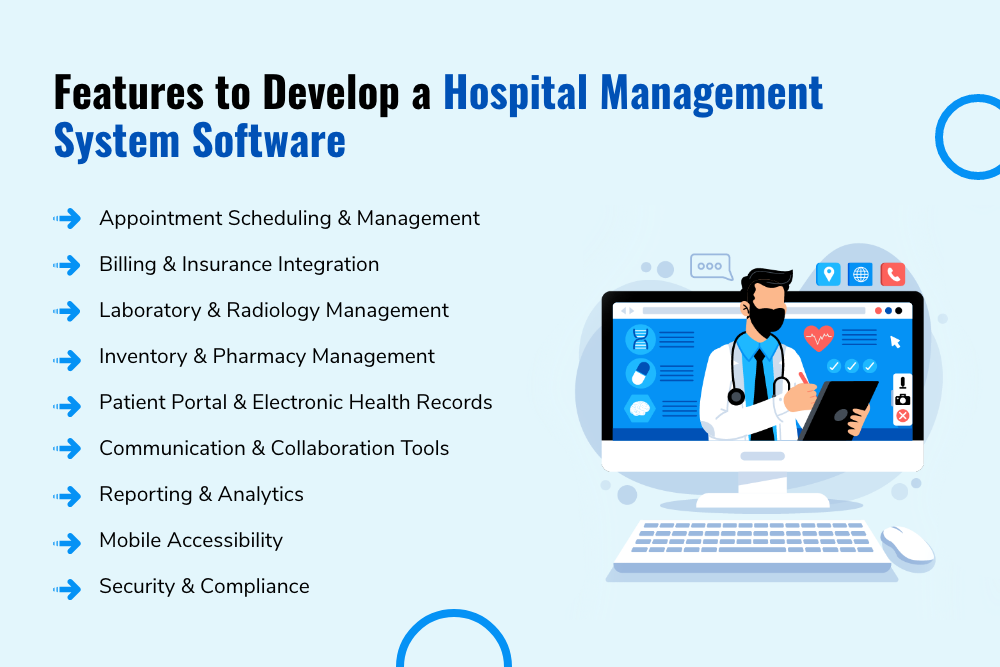
1. Appointment Scheduling & Management
Your software must offer online appointment booking with real-time availability, automated reminders, and waitlist notifications. It should track patient flow, optimize staff schedules, and eliminate scheduling bottlenecks.
2. Billing & Insurance Integration
You can automate invoicing and claim processing to make the financial maze easier to navigate. You should hire healthcare app developers who can smoothly integrate a billing and insurance feature for the correct and timely payments. It accelerates billing processes and lowers administrative effort.
3. Laboratory & Radiology Management
A laboratory management feature is a must-have. It can track lab samples, schedule imaging tests, and receive results electronically. This centralized approach enables fast diagnosis, minimizes delays, and increases departmental collaboration.
4. Inventory & Pharmacy Management
With inventory management features, the hospital administrators can easily maintain real-time inventory levels, set reorder points, and track medication dispensing. This optimizes purchasing, reduces waste, and guarantees medication availability for patients. However, you also integrate these features when you develop a medical website for better user engagement.
5. Patient Portal & Electronic Health Records
Empower patients with a self-service portal to schedule appointments, manage prescriptions, and access their medical history all in one secure platform. You must determine the EMR/EHR software development cost before you integrate robust EHRs for doctors to efficiently record and share accurate health data, fostering informed treatment decisions.
6. Communication & Collaboration Tools
It facilitates secure communication between doctors, nurses, and other healthcare professionals. Also, this software will enable instant messaging, internal forums, and patient care team huddles for seamless coordination and improved treatment planning.
7. Reporting & Analytics
Gain valuable insights into hospital performance with comprehensive reporting tools. Track key metrics like patient wait times, appointment compliance, and resource utilization. Use data to make informed decisions, improve efficiency, and allocate resources effectively.
8. Mobile Accessibility
Your hospital management software must offer a mobile-friendly version for doctors, nurses, and patients to access data, update records, and communicate anytime, anywhere. Additionally, you should also provide mobile accessibility in mental health app development for better user reach.
9. Security & Compliance
Security of patients is the utmost thing. So, your hospital management software must ensure complete data security with industry-standard encryption, access controls, and audit trails. Also, it is vital to adhere to HIPAA regulations and build trust with robust security measures.
Top 5 Hospital Management Software
As you know there are plenty of hospital management software in the market, but we have researched and jotted down the most prominent ones that you can use as a reference while you build a hospitality management system software.
● Smartsheet
Smartsheet is a popular hospital management system designed for efficient administration. It operates by integrating scheduling, patient records and task management which enhance the overall operational efficiency.
● Paragon
Paragon is another software that manages all the hospital tasks. The system enhances efficiency by automating routine tasks, improving accuracy in medical documentation, and facilitating seamless communication among healthcare professionals. So, if you want to develop software like Paragon, you will need software developers for hire.
● Medstar HIS
Medstar HIS software prioritizes data security, adhering to industry standards, and facilitates compliance with healthcare regulations. With user-friendly interfaces and robust features, it optimizes resource utilization, reduces paperwork, and improves overall healthcare service delivery within hospitals.
● Hospilware
The software’s analytics and reporting tools empower healthcare providers to make informed decisions, improving overall patient care and organizational efficiency. Hospilware emerges as a reliable solution for modernizing and optimizing hospital management processes in a user-friendly and secure manner.
● eHospital Systems
eHospital Systems software manages all aspects of hospital operations, from medical records to billing. Modules for managing clinical data, scheduling appointments, patient registration, pharmacy, lab, radiology, and other areas are included.
Benefits of Hospital Management System Software
Now you know the examples of the best hospital management system software, let’s now check out the benefits to develop a hospital management system software for your business.
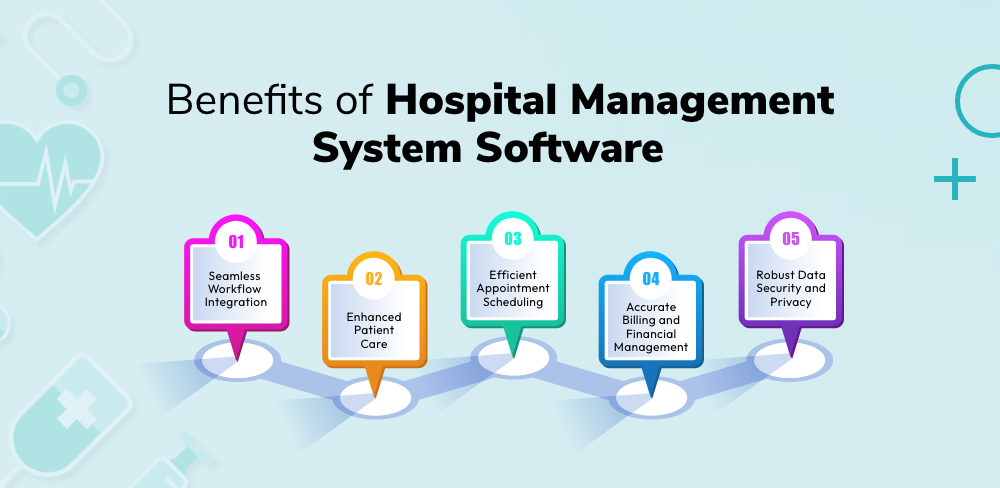
1. Seamless Workflow Integration
Hospital Management System software serves as a centralized platform, seamlessly integrating various departments within a healthcare facility. From patient registration to billing, and from inventory management to staff scheduling, the software ensures a smooth and cohesive workflow.
2. Enhanced Patient Care
One of the primary objectives of any healthcare institution is to provide superior patient care. HMS software plays a pivotal role in achieving this by facilitating quick access to patient records, medical history, and treatment plans. This instant access enables healthcare professionals to make informed decisions promptly, leading to better diagnosis and personalized care for patients.
3. Efficient Appointment Scheduling
Utilizing Hospital Management System software, you might benefit from expedited healthcare services. This system optimizes the schedules of healthcare providers, guarantees timely appointments, lowers wait times, and improves patient satisfaction. Additionally, you can explore seamless healthcare website development for optimal resource allocation, if you want to create a healthcare website.
4. Accurate Billing and Financial Management
In the complex world of healthcare finance, precision is paramount. HMS software automates billing processes, ensuring accuracy in financial transactions. This feature not only reduces the likelihood of billing errors but also streamlines the entire revenue cycle management, contributing to the financial stability of the healthcare institution.
5. Robust Data Security and Privacy
Patient information is highly sensitive, and maintaining its confidentiality is non-negotiable. Strong security features are included into the Hospital Management System software to protect patient data from breaches or unwanted access. This not only ensures compliance with data protection regulations but also fosters trust among patients regarding the confidentiality of their health information.
Cost to Develop a Hospital Management System Software
Now the main question that comes to every entrepreneur’s mind: “what is the hospital management system software development cost?”. Basically, the cost to develop a hospital management system software can range between $10,000-$25,000 or more depending on complexity of the project.
Some factors like functionality, testing, software design along with time can also affect the cost to develop a hospital management system software. Below table showing the cost to build a hospital management software on complexity basis given below:
| Complexity | Cost estimation | Timeframe |
| Basic software | $10000-$15000 | 2-3 months |
| Medium software | $15000-$20000 | 4-6 months |
| Advanced software | $25000 | 7 months |
However, if you want to do clinic software development for your business, then the medical billing software development cost can somehow range between $8000-$25000. It typically includes some necessary functions related to medical bills, which enhance the costs.
Well, to calculate the actual cost to develop a hospital management system software, then you need to get in touch with an experienced company. Like Dev Technosys. They would offer an exact cost and time duration.
Ready to Build Your Own Hospital Management System With Us!
Creating a hospital management system software has main benefits which is work process automation. So, to know how to develop hospital management system software, it is vital to avail SaaS software development solutions from a reputed firm like Dev Technosys.
We specialize in creating user-friendly interfaces, incorporating features like patient records, appointment scheduling, billing, and inventory management. Our dedicated developers ensure seamless integration of modules for efficient workflow.
Our development team focuses on scalability, security, and compliance with industry standards which offers a robust solution tailored to the specific needs of the healthcare sector.
So, what are you up to? Share your requirements with our medical device software development services provider and we will deliver your top-notch hospital software within your budget.
Frequently Asked Questions
1. How Long Does It Take To Develop a Hospital Management System Software?
The time duration to develop a hospital management system software cost will be between 2-8 months or more. Simple software may take 2-3 months and it can rise up to 5-7 months depending on the software complexity.
2. How Much Does Healthcare Website Development Cost?
The healthcare website development cost may be affected by essential factors and website complexity. A basic healthcare website can be around $8,000-$15,000 while the complex website will increase the cost up to $20,000-$25,000.
3. What Are the Core Features Of Hospital Management System?
Below are the essential features of hospital management system you must check out:
- Patient registration
- Doctor & staff management
- Appointment scheduling
- Prescription management
- Analytics & reporting
4. How Much Does It Cost To Maintain a Healthcare App?
The cost to maintain a healthcare app typically ranges from 15-20% of the initial development cost per year. This covers expenses for updates, bug fixes, server hosting, and ongoing support. So, if you want to do app maintenance, then you can avail the healthcare app maintenance services from a reputed firm.
5. What Are the Benefits of Creating Hospital Management Software?
Creating Hospital Management Software streamlines healthcare operations, enhancing efficiency and patient care. Benefits include improved data accuracy, streamlined workflows, better resource utilization, enhanced communication, and comprehensive patient records.
6. What Are the Advanced Features of Hospital Management System Software?
If you want to develop a hospital management system software, then you should include some advanced features for the better user engagement:
- Electronic health records
- Treatment plans management
- Billing and financial management
- Appointment and scheduling
- Laboratory management
- Insurance service integration
- Reports

